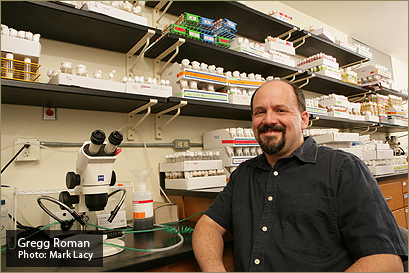
It’s not just the fat and cholesterol in that sizzling bacon that will kill you: The irresistible aroma might too.
A recently published study of fruit flies by a University of Houston researcher raises the possibility that even smelling rich foods may reduce the health benefits of dieting. While it is still too early to draw any conclusions, further studies could shed light on how food odors impact human longevity, said Gregg Roman, assistant professor of biology.
Scientists long have known that restricted calorie intake extends the lifespan of all sorts of organisms, from flies to mice to primates. Tests also have shown it can improve health in humans. But Roman’s research, which was featured in the February issue of Science, one of the world’s most prestigious scientific journals, adds a new twist.
Working with a group of researchers led by Scott Pletcher, an assistant professor at the Baylor College of Medicine, Roman found that food odor can reduce by up to 18 percent the longevity benefit of calorie restriction in fruit flies.
Because fruit flies only live an average of six to seven weeks, they are ideal for longevity studies, Roman said. Also, the metabolic process is similar at the cellular level for all organisms, so studies of fruit flies might have implications for humans.
Fruit flies love yeast and sugar, so to conduct the experiment, researchers gave them a diluted concoction and – as expected – their new diet extended the flies’ lifespan by several days.
Another group of flies – these with a genetic mutation that prevents them from smelling food and other odors – also were given the restricted diet and lived even longer – up to 75 days. This represents an increase in lifespan of more than 45 percent.
Since the genome of the mutant flies was identical to that of the regular flies except for olfactory function – the sense of smell – researchers were able to isolate the role of odors on lifespan, Roman said.
However, they are still not sure how food odors might affect an organism’s metabolic rate, and further studies are needed to explain exactly why smelling food reduces the flies’ lifespan. |

